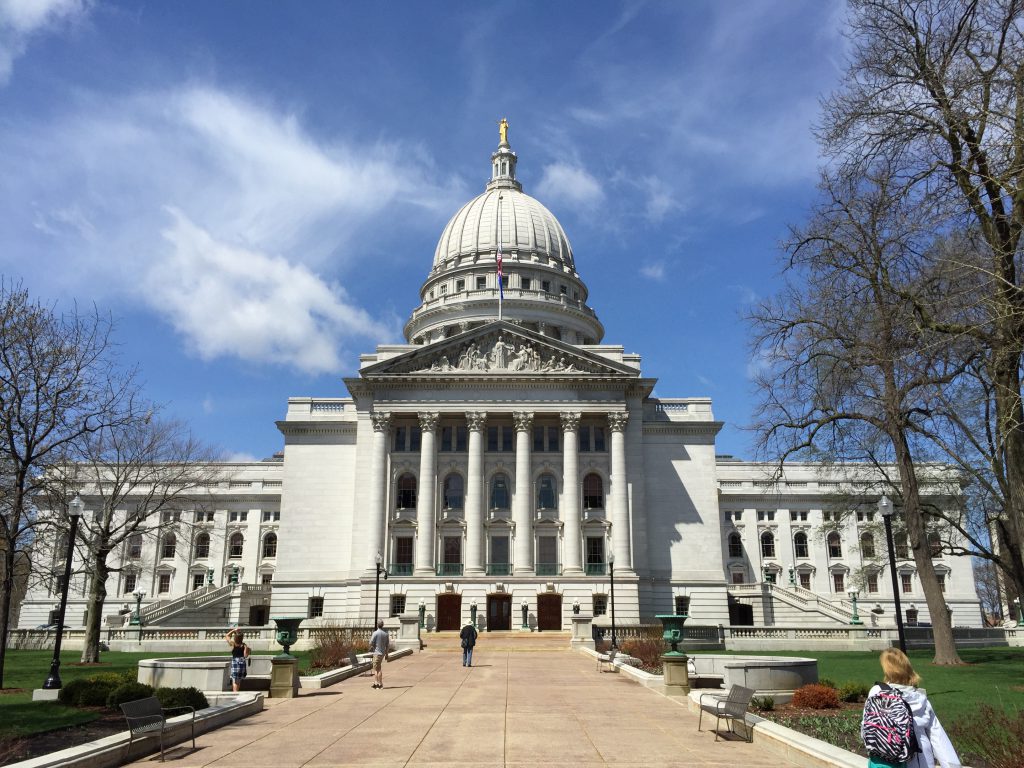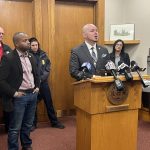New Bills Would Make It Easier to Lose “Welfare Benefits”
After statewide referendum, Legislature debating eight bills that would expedite removal of Medicaid and unemployment benefits.
A week after Wisconsin voters favored an advisory referendum by a 3-to-1 margin that asked if people should be required to look for work in return for “welfare benefits,” lawmakers held hearings on eight bills that the Republican authors said reflect that sentiment.
Five of the measures would make changes to Wisconsin’s unemployment insurance system, most of them aiming to make it easier to take away jobless pay. One would make it easier for the state to kick people off Medicaid.
Another bill would bar tax-funded guaranteed basic income programs in the state. Those don’t currently exist anywhere in Wisconsin, although Madison is testing a privately funded program paying $500 a month to people with incomes up to 200% of the federal poverty guideline.
“Wisconsin taxpayers have already helped to fund countless state programs designed to assist low-income individuals and families,” said Rep. Amy Binsfeld (R-Sheboygan), author of AB-146, at an Assembly Local Government Committee hearing. “We should not be asking the taxpayers to fund another handout on top of the already taxpayer funded benefits. We especially want to make sure that our labor force is getting the workers that they need and [employers don’t] have to continue to beg on top of these programs.”
The hearing was one of four before Assembly committees Wednesday on the collection of bills. Republican lawmakers endorsing the legislation sounded similar themes in their appraisals, as did lobbyists for business groups that spoke in favor.
All of the bills were formally introduced on Friday. Requests to state agencies for fiscal analyses of the cost of the bills went out Monday and were not available at Wednesday’s hearings.
One recurring theme for the day was the difficulty that employers have been reporting, especially in the last two years, in filling job openings.
“The biggest challenge facing Wisconsin employers is workforce shortage,” said Rachel Ver Velde, who directs workforce, education and employment policy for Wisconsin Manufacturers & Commerce, the state’s largest business lobby. In a survey of members, “85% of our employers indicated that they’re struggling to find workers.”
She spoke at a hearing in the Assembly Labor and Integrated Employment Committee, where lawmakers discussed one bill revamping the state unemployment insurance system and another on assessing state workforce training and placement programs.
Several Republican lawmakers also alluded to the April 4 ballot measure that asked, “Shall able-bodied, childless adults be required to look for work in order to receive taxpayer-funded welfare benefits?” The measure passed on a 79%-20% vote.
Speaking on behalf of a bill that would require audits of half of all work searches by people who collect unemployment insurance (UI), Rep. David Armstrong (R-Rice Lake) said, “Wisconsin voters in last Tuesday’s referendum overwhelmingly supported the work search requirement for able bodied, childless adults who receive UI and other taxpayer-funded benefits.”
The ballot question did not refer to UI, however, and taxpayers don’t fund the unemployment system, said Rep. Christine Sinicki (D-Milwaukee) at a separate hearing on a different UI bill. It’s funded by employers, who are charged based on their history of layoffs.
“UI is not taxpayer money,” Sinicki said. “So all these bills that are coming forward that are based on the referendum, and have to deal with unemployment insurance, [that] is false information.”
Democratic lawmakers greeted all of the bills with skepticism. Several times, they asked authors of the UI bills whether they had consulted with either the Department of Workforce Development (DWD), which operates the system, or with the state’s joint labor-management unemployment insurance advisory council.
The answers were largely the same — that the council or the agency was welcome to provide input, but that there hadn’t been direct outreach to either.
“Not only was the department not addressed at all in the creation of these bills,” said Rep. Katrina Shankland (D-Stevens Point) at a hearing on several unemployment insurance bills, “but also the most important people, the ones who are really working together on a frequent basis to compromise and build consensus, the UI council, wasn’t addressed at all.”
Medicaid
In the days since the bills were introduced, just one has generated multiple registrations opposing the measure with the Wisconsin Ethics Commission: AB-148, which would tighten the process for people who are covered by Medicaid to remain eligible for the health insurance program in Wisconsin. The bill is a slight rewrite of a measure that passed the Legislature on party line votes in both houses in early 2022 and was vetoed by Gov. Tony Evers.
Medicaid, which is known as BadgerCare Plus in Wisconsin, provides health insurance including doctor and hospital visits to people with incomes below the federal poverty guideline. The program is jointly funded with federal and state money. Participants must renew with the program once a year, proving they are eligible.
AB-148 would bar the state Department of Health Services (DHS), which administers Medicaid, from automatically renewing recipients. The measure also would block the state from providing recipients at renewal time forms that have been already partially filled out. And the bill would also require DHS to review each participant’s eligibility every six months instead of every year.
Under the bill, people who fail to report a change, such as increased income, that makes them ineligible would be blocked from Medicaid for six months. The bill also requires DHS to confirm financial and other personal information for each Medicaid recipient against that information about the person that any other state agency has in its records. In addition, DHS would be required to share its data with other agencies that operate public assistance programs.
The bill requires DHS to seek federal waivers for any of its proposed requirements not currently permitted by the federal government.
In written testimony submitted to the Assembly Health, Aging and Long-Term Care Committee hearing on the bill, DHS legislative director H.J. Waukau stated that implementing the legislation “could risk all of the federal funding Wisconsin receives for the Medicaid program” — $7 billion a year.
The bill’s every-six-month renewal requirement and the restrictions it puts on the renewal process are not permitted under federal regulations, Waukau wrote. The federal rules also “do not permit the state to add disenrollment penalties as an extra eligibility requirement under Wisconsin’s existing state plan for Medicaid.”
At the hearing, a committee member, Rep. Donna Rozar (R-Marshfield), said she views the bill as necessary to prevent people from obtaining Medicaid when they aren’t eligible and could get health care from other resources.
“I truly believe that the taxpayer is paying for health care that people could afford, or get [as] an employee,” Rozar said. “I’m all for helping people that need help, but unfortunately, our safety net has become a hammock over the years.”
In 2021, according to the Kaiser Family Foundation, a health care policy research organization, 53% of Wisconsin employers provided employee health coverage.
The only public testimony on the bill at Wednesday’s hearing came from a legislative aide to Rep. William Penterman (R-Columbus), its lead author, and Adam Gibbs of the Florida-based Opportunity Solutions Project, which has opposed measures to expand Medicaid and to reduce administrative roadblocks to Medicaid participation.
“We want to reserve Medicaid dollars for Wisconsinites who are actually eligible for Medicaid,” Gibbs told the health committee.
Several organizations opposing the bill submitted written testimony warning that if enacted it would drive eligible people off of Medicaid, however.
“Through increased renewals, prohibiting automatic renewals, disallowing DHS from using best practices for renewals, such as pre-populating forms, this bill would greatly increase administrative burdens, which would likely worsen inequality and health disparities,” stated William Parke-Sutherland, senior health policy analyst for Kids Forward, in written testimony opposing the bill.
“The evidence is clear that policies that increase administrative red tape for patients lead to coverage losses for individuals with serious and chronic health conditions,” the Wisconsin chapter of the American Lung Association stated.
Unemployment insurance
Hearings in two different committees took up bills to change Wisconsin’s UI program, which came under severe strain as claims skyrocketed at the start of the COVID-19 pandemic. Since then Wisconsin’s jobless rate has dropped down to less than 3%, and there were 4,726 initial unemployment claims the week ending April 1, according to the Department of Workforce Development (DWD).
- AB-150 would change the name of “unemployment insurance” to “reemployment assistance.” The bill would require DWD to develop lists of potential jobs for each recipient and require recipients to apply for jobs on those lists. The bill also would institute required drug tests for UI recipients, who would be cut off from the program if they flunk. Evers vetoed a similar bill in the last session of the Legislature.
- AB-147 would increase the grounds for which a person fired for misconduct can be disqualified from collecting UI. It also would require DWD to audit at least half of the work searches that UI recipients report. In addition, the measure would give the Legislature’s Joint Finance Committee the opportunity to reject future federal UI enhancements, such as those provided in the first year and a half of the COVID-19 pandemic.
- AB-149 would deny a week’s benefit for UI recipients accused of declining a job interview, failing to respond to an employer’s job interview offer or failing to show up to an interview.
- AB-152 would directly authorize the Wisconsin Department of Administration to transfer workers across state agencies to DWD when needed to meet heightened demand to process claims.
- AB-153 would reduce the number of weeks that people could collect jobless pay based on the unemployment rate. The current time limit is 26 weeks. The bill would limit that to 14 weeks when the unemployment rate is 3.5% or less and raise it gradually, allowing 26 weeks only when unemployment is 9% or higher.
- AB-151 relates not to the UI system but to the dozens of workforce-development related programs operated by DWD or other state agencies. The bill would require each program to be assessed regularly based on the employment statistics and median earnings of people who have completed the program and the percentage of program participants in training for “recognized” credentials or jobs.
Authors of the UI-related bills testified that if enacted they could streamline the process of putting jobless people back to work while reining in potential fraudulent claims.
But Victor Forberger, a Madison lawyer who practices almost exclusively in helping people with UI claims navigate denials, dismissed the bills, saying that they don’t address UI’s purpose or the needs of people who are without work. Forberger wrote about them on his blog and testified before the Workforce Development and Economic Opportunities Committee on Wednesday.
The number of people who file for unemployment after losing jobs has been dropping, said Forberger, who called for a much simpler application process and for recognizing that the UI system is intended to sustain consumer spending and the economy.
“Unemployment is disappearing in this state,” he told lawmakers. “And one of the major concerns is you are debating a bunch of bills about a program that almost no one is partaking in anymore.”
Lawmakers debate bills that would create new barriers to benefits was originally published by the Wisconsin Examiner.























Republican politicians have so much to offer us.
They lie about the law to rile people up and then toss out their toxic brew to make people feel good. Looking for work requirements are already the law and have been for decades. This “advisory” question was meant to generate a “those lousy loser deadbeat are hanging out at home all day and not looking for work? I hate them so much” vote.
They define “Unemployment Compensation” as “Welfare.” Why? Because it has become their codeword for attacking blacks, Hispanics and poor people – people they really do not like. As a program that employees and employers pay for, and no one who did not work get nothing, calling this Welfare is as puzzling as charging trump as an adult.
To top it off, they attack the concept of healthy people while using tax money to pay for their own insurance. b And they remain clueless about why they lose statewide elections. It is not abortion, it is about massive tax breaks for the rich while attacking and taking away from those who have almost nothing most of what they they have left.